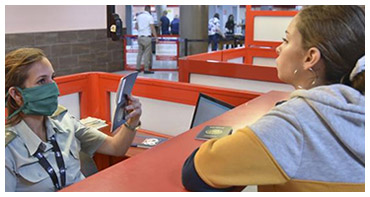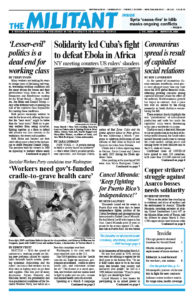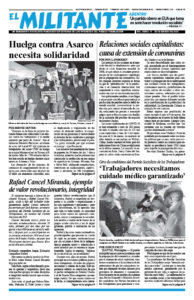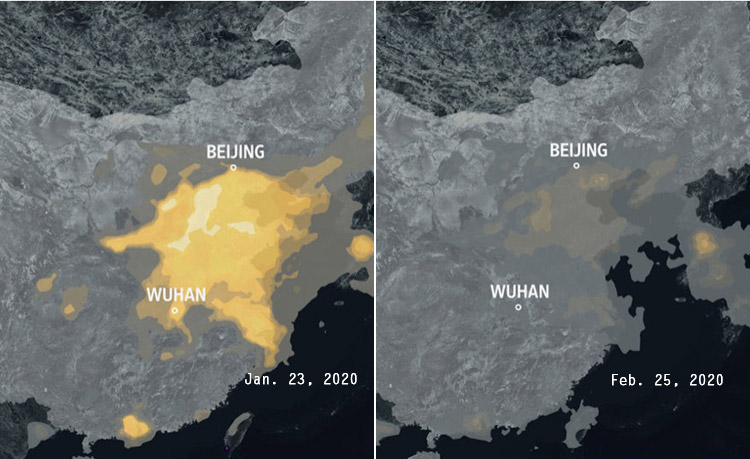
As the spread of coronavirus disease continues worldwide, stock prices have plunged more than any time since the 2008 global financial crisis, reflecting growing concerns among capitalist investors about the effect of the outbreak. World economic growth has begun to contract. And a price war over oil started by the ruling monarchy in Saudi Arabia is exacerbating the fall.
These external shocks highlight the way “globalization” of international production and trade has made the capitalists’ crisis worse, threatening to tip into a worldwide recession.
Unable to reach a deal with Moscow to cut oil production in the face of faltering world demand, the Saudi rulers instead boosted production to swamp the crude market, cutting prices and dealing blows to both Moscow and to the U.S. shale oil bosses.
Confirmed cases of COVID-19 have spread to over 120 countries, with more than 125,000 infected and 4,600 deaths as of March 11. The bulk of those are still in Wuhan, China, where the outbreak began. The number of infections outside China tripled in the past week. The majority were in Italy, Iran and South Korea, but numbers are growing in the U.S. and across Europe.
In addition to the slump in trade with China and disruption to global supply chains, travel bans by bourgeois governments are impacting airlines and tourism.
What is unfolding is a social crisis, exacerbated by dog-eat-dog capitalism.
There are now over 10,000 cases in Italy and 631 deaths, the highest number outside China. Rome imposed a blanket travel ban across the whole country March 9. Authorities said containing the virus required blocking family visits to all prisoners, leading to protests in more than 25 prisons across the country, with six inmates killed.
In Britain, where most jails are overcrowded, the ministry of justice claims to have “robust contingency plans” to protect prisoners from the disease, but these seem to amount to providing them facilities to wash their hands.
For the capitalist rulers, the only measures they know to control the spread of the disease are actions against working people — mass quarantines, travel bans, school closures and other harsh restrictions, reinforced by criminal penalties. For working people there is a different road — exemplified by the Cuban Revolution — of mobilization and solidarity.
Russian President Vladimir Putin has banned virtually all public events for the next month, as much to prevent protests against his moves to extend his presidency through 2036 as to impede the virus.
In northern Italy, hospitals have almost run out of beds for patients. Giorgio Gori, mayor of Bergamo, tweeted, “Patients who cannot be treated are left to die.”
Across the U.S. bosses have been closing hospitals and clinics in rural areas and working-class urban neighborhoods they say don’t generate enough profits. This further constricts the facilities to treat people.
Gov. Andrew Cuomo in New York imposed a National Guard-enforced lockdown in New Rochelle March 10.
And in Kirkland, Washington, outside Seattle — where gig-economy behemoths Amazon and Google told their employees to work from home — patients at a nursing home where the disease has hit are quarantined. Their relatives are banned from visiting, forced to communicate through closed windows from outside.
The U.S. Centers for Disease Control and Prevention says it has five tiers for who should get treatment. At the top are military troops deployed abroad and cops at home, as well as bankers and bosses at pharmaceutical companies. Ordinary workers are at the bottom.
Contrast with revolutionary Cuba
In sharp contrast to the travel bans, harsh shutdowns and class-driven priorities for hospital space elsewhere, in revolutionary Cuba every person is treated, irrespective of their travel or contact history. Everyone arriving by sea or air is checked for signs of the disease and a medical examination conducted if needed. Hospitalization or other treatments are ready. Special care is prepared for the most vulnerable. No one is left on their own.
Special efforts are being mobilized by the government, the country’s mass organizations and the unions to keep working people informed and involved. The neighborhood medical system is organized to make sure everyone gets personal attention, and it’s free.
Impact on capitalist economy
The dual-port complex of Los Angeles and Long Beach, the largest harbor in the U.S., has seen a fall this year of half a million containers, 15%, from the China trade, which accounts for half the volume of the port.
Tens of thousands of jobs, from dockworkers to truck drivers and warehouse workers, are affected as production, trade and shipping falls. Shifts for permanent longshoremen in Los Angeles are down by a fifth and workers employed as “casuals” have lost 90% of their shifts.
Of the 13,000 truckers who transport containers from the port, 80% are “independent contractors,” paid by the load. Many are Latino immigrants, forced to pay for their “own” trucks, gas, etc. With no income and unable to meet mortgage payments, some are faced with having to sell their rigs.
With broad erosion of trust in the capitalist governments’ abilities to cope with the social and health crisis, amplified by social media panic, there has been a rush to stock up on masks and hand sanitizer, food and toilet paper, and more, leaving shelves bare and frustrated customers angry.
The pressure to restock is adding to the bosses’ speed-up imposed on retail workers across the U.S. And the big store owners like Walmart and Target, in addition to their low hourly rates, don’t pay sick leave.
Despite a sophisticated medical system with high levels of science and technology, under capitalist control the “health care” services in the U.S. are driven by pursuit of profits for insurance, pharmaceutical, hospital and medical-equipment corporations. Health care is a costly commodity beyond the reach of many working people.
More than 27.5 million people in the U.S. have no health insurance. Almost a third of the population were classified as “underinsured” in 2018, meaning they can’t afford the thousands of dollars in “co-pay” charges when they get sick.
A March 5 nationwide survey by the 150,000-member National Nurses United union exposed glaring unpreparedness in many hospitals with no plans, isolation procedures or facilities for the coming surge in COVID-19 cases. There are meager stocks of personal protective equipment for medical staff and few have been trained to properly use what there is.
And — as in all capitalist countries worldwide — there is a critical shortage of kits to test if people have the disease, which facilitates the spread of the virus.
Workers and farmers across the world need to find ways to unite and organize to cope with this social crisis, which the capitalist rulers visit most sharply on the working class.


